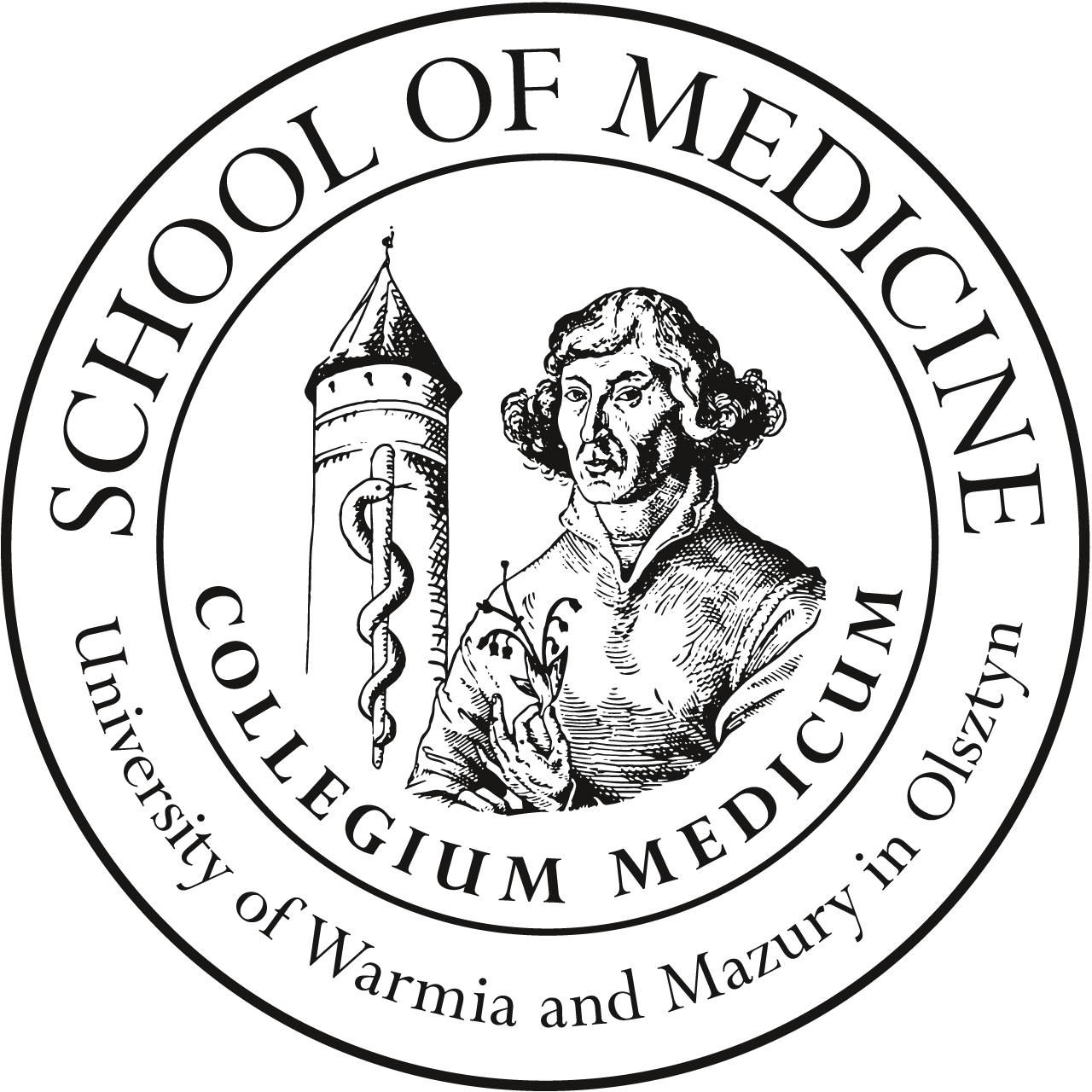REGULATIONS
University of Warmia and Masuria in Olsztyn
Collegium Medicum
RULES and REGULATIONS WITH COURSE of GERIATRICS
for students of the 4-th year of the Medical Faculty of the University of Warmia and Masuria in Olsztyn
1. General information
1.1 Classes are conducted by the Department of Family Medicine and Infectious Diseases.
1.2 Employees responsible for the implementation of the subject:
1. Course coordinator - Małgorzata Stompór MD, PhD
2. Persons responsible for the implementation of individual types of classes - Małgorzata Stompór, MD, PhD
1.3 The place, time and subject matter of particular forms of classes and credits are defined in the following documents: study plan, syllabus, schedule and subjects of classes.
1. Didactic classes have the form of:
2. Lectures - stationary lectures
3. Exercises - exercises take place in the Health Care Center Complex in Dobre Miasto and in the Geriatric Ward of the Hospital in Nidzica
4. Seminars - 8 hours of seminars.
2. The rules of student participation in particular forms of classes (dress, student behavior during classes, etc.)
Recording, recording and photography are prohibited.
Practical classes are conducted on the basis of curricula and study plans. Students are required to attend classes according to the program and schedule for the group to which they are assigned.
Before entering class, students should leave their jackets and coats in the cloakroom. Protective clothing (aprons) is required during practical classes. All clothes should remain clean
and well cared for. Students are required to wear their personal ID at all times. Students may not be allowed to participate in classes without appropriate clothing, so they will have to repeat the classes at another time.
Students are required to keep their surroundings clean at all times. Smoking is prohibited in all hospital facilities. Students may eat meals only during breaks.
The student is obliged to familiarize himself with the health and safety rules in the place of conducting classes andwith the EU GDPR directive. Students must follow general safety rules (OSH)
and the EU GDPR regulations during all classes.
Students may stay in the seminar room only with the teacher. Students may not leave class without teacher permission. Practical classes are held in individual hospital wards.
Students are required to familiarize themselves with the information materials and specific knowledgein the curriculum for individual exercises and seminars. The teacher can check the level of knowledge of students on the basis of a written or oral test. Students are required to actively participate in classes/seminars and participate in discussions in subgroups -
otherwise, they may be excluded from certain classes/seminars.
3. Attendance at classes, how to justify and make up for absences
1. Attendance in all forms of classes is obligatory.
2. All absences must be excused.
3. A student may have only one excused absence during the entire academic year without having to make up for classes.
4. The method of justifying absences from particular forms of classes (including credits and exams) is carried out in accordance with the procedure specifying the rules for justifying absences from classes, exams and credits at the Faculty of Medicine.
5. In the case of 2 or more absences:
- absence from the lecture - the student is obliged to pass an oral test on the material presented at the lecture,
- absence from the seminar or classes - the student is obliged to repeat the seminar/exercise with another group. The student is obliged to make up missed classes by the end of the current semester.
4. Rules for passing individual forms of classes:
4.1 Lectures
1. Attendance at all lectures
2. The material covered during the lectures is included in the thematic scope of the semester credit for the grade.
4.2 Exercises
1. Students are required to read the information materials and knowledge specified in the curriculum for individual classes. The teacher may check the level of students' knowledge on the basis of a written or oral test. Students are required to actively participate in classes and participate in discussions in subgroups - otherwise they may be excluded from certain classes.
2. Exercises are held in contact with patients over 60 years of age. – during the exercises, students learn to make a comprehensive geriatric assessment and plan a diagnostic and therapeutic process.
3. The final evaluation of the exercises is based on the student's presence and activity in the classes.
4.3 Seminar
1. Students are required to familiarize themselves with the information materials and knowledge specified in the curriculum for individual seminars. The teacher may check the level of students' knowledge on the basis of a written or oral test. Students are required to actively participate in seminars and participate in subgroup discussions - otherwise they may be excluded from certain seminars.
2. Pass - attendance at all seminars; seminars are held using the method of presenting cases, followed by discussion and planning of diagnostic and therapeutic procedures.
3. The final evaluation of the seminar is based on the student's activity during the classes and the results of the written or oral test during the classes.
Rating system:
- Very good - (5.0)
- Above Good - (4.5)
- Good - (4.0)
- Fairly good - (3.5)
- Sufficient - (3.0)
- Insufficient - (2.0)
5. Semester credit
1. The condition for taking the semester credit is the presence and passing of classes and seminars (as above) and attendance at lectures.
2. The knowledge needed for the final credit constitutes the material covered during lectures, tutorials and seminars.
3. The student has the right to take one written test. In case of receiving an unsatisfactory grade, the second term is also written - 3 questions, at least 2 of which the student must answer satisfactorily.
4. in the case of not obtaining a semester pass; in the case of passing lectures, seminars and tutorials in the following year, a written/oral test will be repeated.
5. The credit consists of a written single-choice test (30 questions) - the credit is carried out in the stationary form. To pass, a student must score a minimum of 60% (one point per correct answer) on the written test.
6. The person responsible for conducting the test is Małgorzata Stompór, MD, PhD.
7. Grading system:
– Very good - (5.0)
- Above Good - (4.5)
- Good - (4.0)
- Fairly good - (3.5)
- Sufficient - (3.0)
- Unsatisfactory - (2.0)
8. The student has the right to get acquainted with the assessment of his/her credit after the grades have been issued after agreement by phone or e-mail with Małgorzata Stompór MD, PhD (tel. 604534491 or email: malgorzata.stompor@uwm.edu.pl or mstompor@tlen.pl) .
9. Substantive consultations and making up for absences take place after seminars and/or practical classes have ended on a given day.
6. Academic integrity and honesty:
Determining the principles of academic lawfulness and honesty, as well as the rules of conduct in the event of their violation (e.g. cheating, cheating on colloquia, providing information, etc.).
1. Any form of cheating during final exams is strictly prohibited, will be recorded in the student file and will result in disqualification from the course.
7. Issues not regulated in the presented regulations of Geriatrics classes at the Department of Family Medicine and Infectious Diseases are the responsibility of the Head of the Department, dr hab. n. med. Jerzy Romaszko, prof. UWM.
8. The rules of classes are in accordance with the Rules of Studies of the UWM and the procedures in force at the Faculty of Medicine. Course coordinator
Małgorzata Stompór, MD, PhD
geriatrician, specialist in internal medicine


